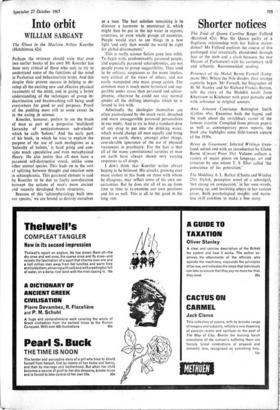Into orbit
WILLIAM SARGANT
Perhaps the reviewer should state that over two earlier books of his own Mr Koestler has been very critical of those who seek to try to understand some of the functions of the mind in PavIonian and behaviouristic terms. And this despite their proven success in helping to de- velop all the exciting new and effective physical treatments of the mind, and in giving a better understanding of the techniques of group in- doctrination and brainwashing still being used everywhere for good or evil purposes. Proof of the pudding must still to some extent lie in the eating in science.
Koestler, however, prefers to see the brain of man as part of a purposive 'multilevel hierarchy of semiautonomous sub-wholes' which he calls 'holons.' And the early part of his book, in which he tries to explain the purpose of the use of such neologisms as a 'holarchy of holons,' is hard going and con- tains much speculative and even metaphysical decry. He also insists that all men have a paranoid self-destructive streak, unlike some other animal species. This leads on to the sort of splitting between thought and emotion seen in schizophrenia. This paranoid element is said by Koestler to be due to fanity coordination between the actions of man's more ancient and recently developed brain structures.
Because of this `schizophysiology built into our species,' we are bound to destroy ourselves
as a race. The best solution remaining is to discover a hormone to counteract it, which might then be put in the tap water in regions, countries, or even whole groups of countries. People would start to see things in a new light 'and only then would the world be right for global disarmament.'
This is really science fiction gone into orbit. To begin with, predominantly paranoid people, and especially paranoid schizophrenics, are not people prone to group suggestibility. They tend to be solitary, suspicious as the name implies, very critical of the views of others, and not easily stampeded into mass group action. The common man is much more hysterical and sug- gestible under stress than paranoid and schizo- phrenic, otherwise he could not stay normal amidst all the shifting ideologies which he is forced to live with.
Admittedly the ideologies themselves are often promulgated by the much rarer, detached and more unsuggestible paranoid personalities in our midst. And to try to find a standard dose of any drug to put into the drinking water, which would change all men equally and bring peace on earth, shows, amongst other things, considerable ignorance of the use of physical treatments in psychiatry. For the fact is that all of the many constitutional varieties of man on earth have always shown very varying responses to all drugs.
I don't think that Koestler writes always hoping to be believed. His attacks, growing ever more violent in this book on those with whom he disagrees, may reflect some of his own un- certainties. But he does stir all of us up from time to time to re-examine our own positions and his as well. This is all to the good in the long run.










































 Previous page
Previous page